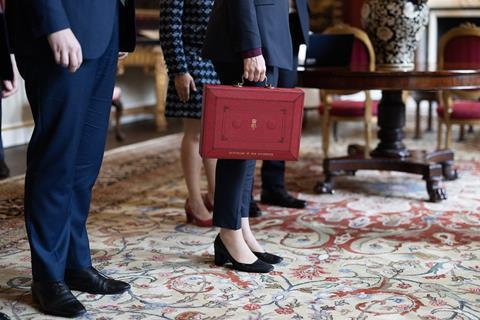The chancellor has announced more than £100bn in capital spending over the next five years after confirming changes in the definition of debt to allow greater government investment.
Delivering her first budget this morning, Rachel Reeves said the only way to drive economic growth was to “invest, invest, invest”, describing Wednesday as an opportunity to “turn the page on the last 14 years”.
“Today’s budget marks an end to short-termism,” she added.
The Office for Budget Responsibility (OBR) has forecast that her plans will boost growth for the UK, but only in the short term.

Rachel Reeves has announced £100bn in capital spending over the next five years
Departmental capital spending limits are set to incease by an average of 3% each year to 2030, including a 9.9% real terms increase of £13bn next year.
Reeves noted that the government’s efforts to restore economic stability had “begun to create the conditions that businesses need to invest”, but that there was “also a need for public investment”.
She said that the result of successive Tory chancellors cutting investment was “hospitals without the equipment they need, school buildings not fit for our children, a dissipate lack of affordable housing”.
Reeves announced £6.7bn of capital investment for the Department for Education next year, a 19% real-terms increase on this year.
That includes £1.4bn to rebuild over 500 schools, including those affected by reinforced autoclaved aerated concrete (RAAC). This represents a £550m boost to the School Rebuilding Programme.
A further £950m has been committed for skills, £300m for improving colleges’ estates and £15m to begin delivery of Labour’s pledge to create 3,000 new or expanded nurseries.
She also promised a £3.1bn increase in the NHS capital budget.
Money for the NHS incudes £1.5bn for new surgical hubs and diagnostic scanners to build capacity for more than 30,000 additional procedures and more than 1.25 million diagnostic tests.
Around £70m to invest in new radiotherapy machines to improve cancer treatment and more than £1bn will be spent to tackle RAAC in the NHS estate.
The Budget also included £5bn to deliver the government’s housing plans, £1bn to remove dangerous cladding, money to begin tunnelling to deliver HS2 to Euston, £3.4bn to “kickstart” the warm homes plan.
“The choices I have made today are the right choices to rebuild Britain,” she said.
The new spending will be underpinned by Reeves’ plan, announced at the weekend, to use a new definition of debt, known as “public sector net financial liabilities”.
She explained that this meant the government would “count the benefits of that investment not just the costs”.
The government will establish four guardrails to ensure investments are value for money.
More on the Autumn Budget 2024
Budget hits employers as Reeves raises taxes by £40bn
Reeves confirms funding for HS2 Euston station tunnels, but not for station itself
Autumn Budget 2024: key measures for construction at a glance
Chancellor announces £3bn in guarantees for SME housebuilders
Firstly, financial investments will be delivered by expert bodies like the National Wealth Fund and will be expected to earn a rate of return at least as large as that on gilts.
The role of institutions to improve infrastructure delivery will be strengthened, while capital budgets will be set for five years and expended at every spending review.
Finally, Reeves said she would ensure there was greater transparency for capital spending with robust annual reporting of financial investments based on accounts audited by the National Audit Office and made available to the office for Budget Responsibility at every forecast.
She also announced the appointment of David Goldstone as the new chair of the Office of Value.
The Office for Budget Responsibility has forecast a slight bump in its growth forecast for 2025 as a result of Reeves’ budget - from its March estimate of 1.9% to 2% today.
However, growth rates are expected to fall to around 1.5% towards the end of the forecast.
“Budget policies temporarily boost output in the near term, but leave GDP largely unchanged in five years,” it said.
“If the increased level of public investment were sustained, it would permanently raise supply in the long term and by significantly more than it does in the forecast period.
It estimates that Budget policies will increase spending by almost £70bn (a little over 2% of GDP) a year over the next five years, with a third of this going on capital spending.

